
You've likely seen the word thru in place of through, but are they the same word? Do you go to the drive-thru or the drive-through? Are both correct? Learn the answers to these questions and more as well as the difference between through and thru.
The Difference Between Through and Thru
Unlike homonyms, which sound the same but have different definitions, through and thru can be used interchangeably. But should they?
- Through is a preposition that generally means movement from one point to another or from beginning to end.
- Thru is an alternate spelling of through. It has the same meaning and usage, but it should only be used in informal writing
Examples of Through
Through can be used in several contexts. It can also mean completely.
He drove through the city
I’m not through yet.
Let me through.
Through is also used in expressions and idioms. These expressions either include through in a phrase or are compound words.
She’s good through and through.
I had to jump through hoops to get here.
The scientist made a breakthrough discovery
Examples of Thru
Thru is used in place of through in text messages or social media posts and is popularly used in words like drive-thru.
I’m going through the drive-thru.
We did a run-thru of the play.
R u thru?
What About Threw?
In addition to through and thru, readers should look out for threw. Threw is a homonym, meaning it sounds like through but it has a different spelling and definition. Threw is the past tense of the verb "to throw."
He threw the ball.
I threw a fit when I heard the news.
The time change really threw me off.
Tips to Get You Through
Now that you’ve mastered the difference between through and thru (and threw), check out some more deceptively similar words. Are you feeling nauseous ... or nauseated? Explore the difference between these terms and others, such as break and brake and born and borne.